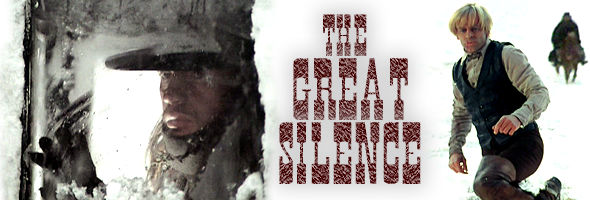

Color, 1968, 106 mins. 36 secs.
Directed by Sergio Corbucci
Starring Jean-Louis Trintignant, Klaus Kinski, Frank Wolff, Vonetta McGee, Luigi Pistilli
Film Movement (UHD & Blu-ray) (US R0/RA 4K/HD), Filmjuwelen (UHD, Blu-ray & DVD) (Germany R0/RB/R2 4K/HD/PAL), Eureka (Blu-ray) (UK RB HD), Studiocanal (Blu-ray & DVD) (France RB/R2 HD/PAL), TC Entertainment (DVD) (Japan R1 NTSC) / WS (1.85:1) (16:9), Fantoma (DVD) (US R1 NTSC), Digital Classics (DVD) (UK R2 PAL), Beyond Home Entertainment (DVD) (Australia R4 PAL) / WS (1.66:1)
Never released theatrically in the U.S. upon its completion, The Great Silence was one of the most neglected top-rung spaghetti westerns for
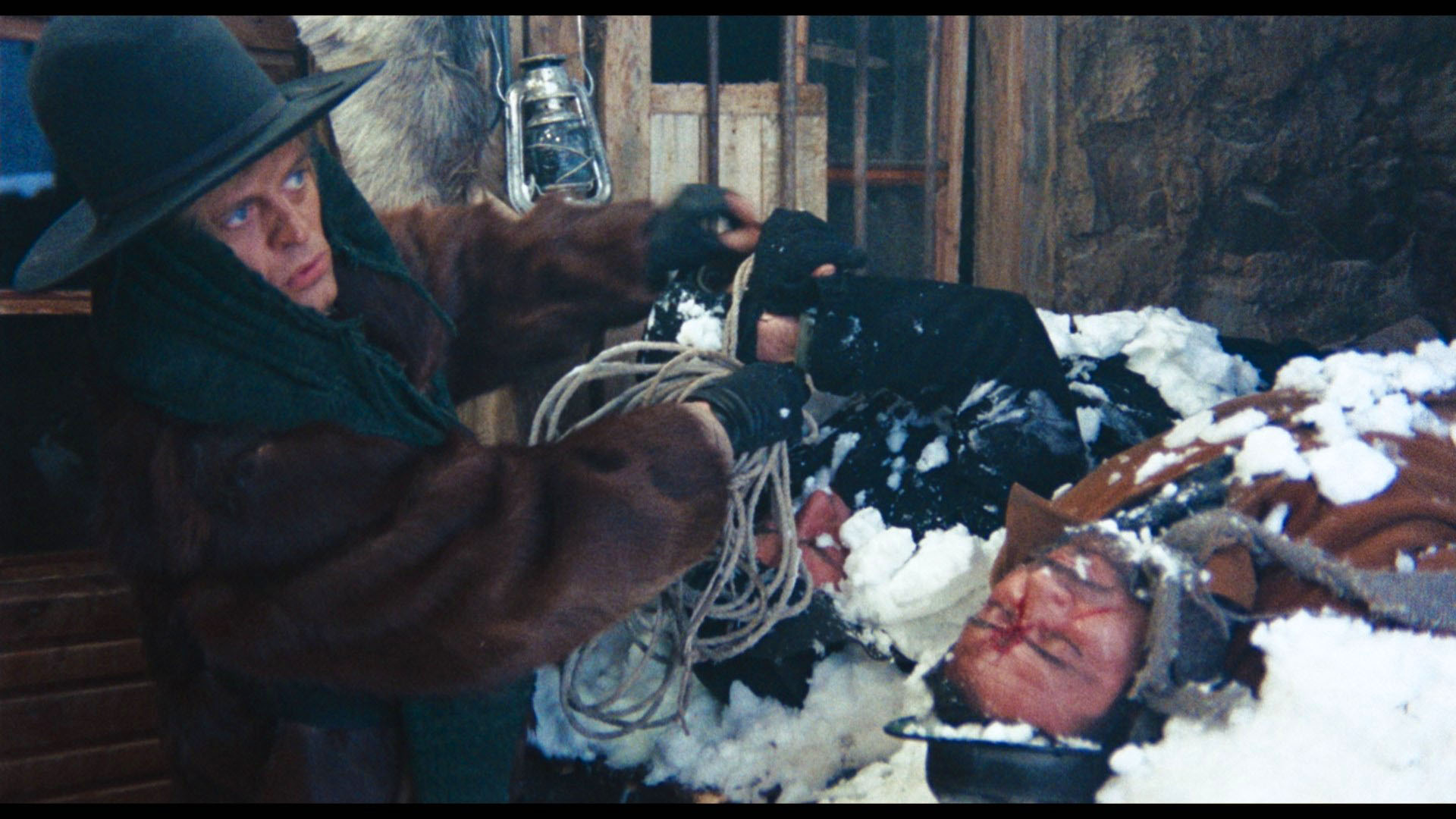 years until it finally found its cult following.
years until it finally found its cult following. 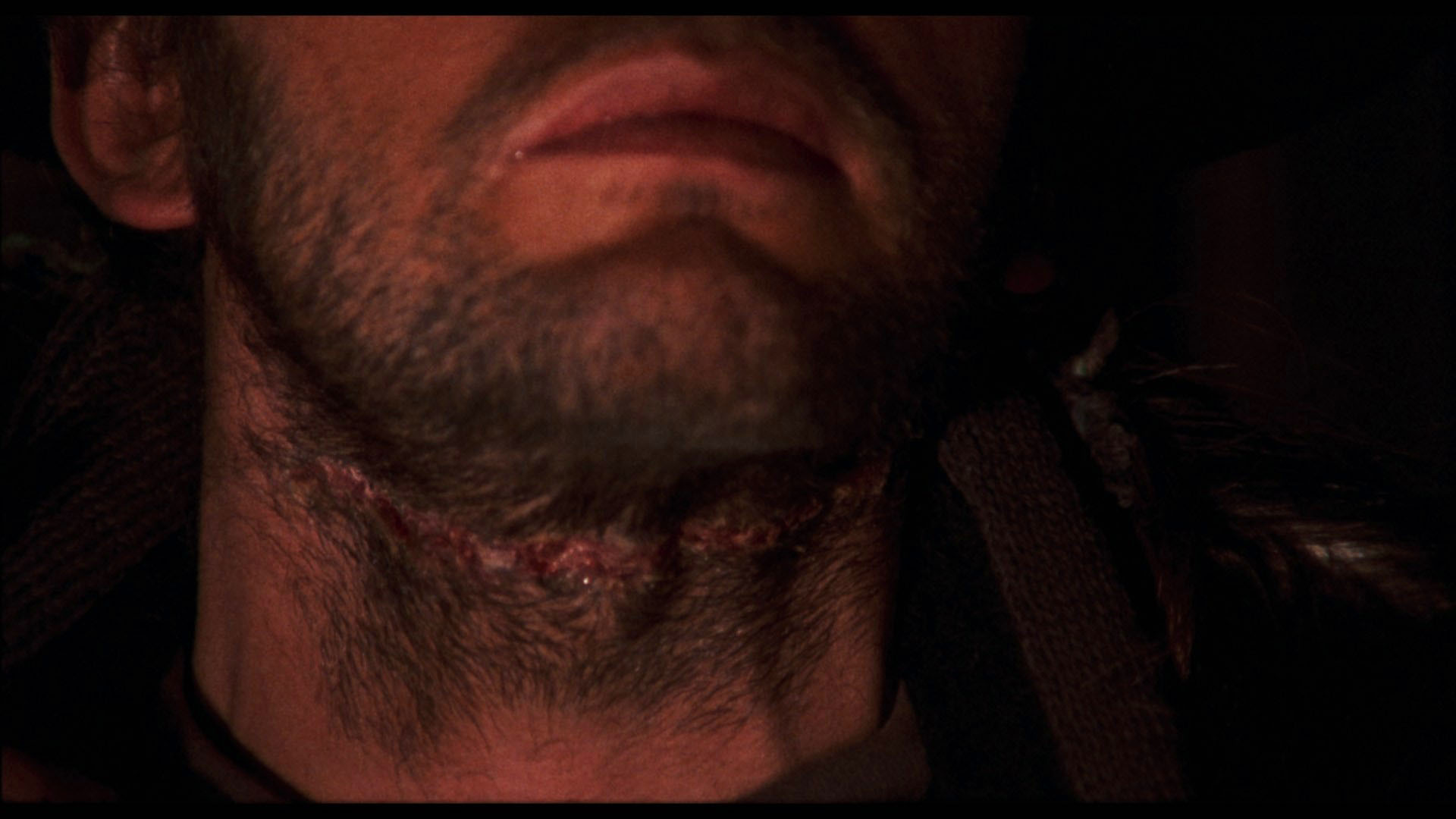 The constant snowfall and eccentric storyline immediately set it apart from its desert-bound ilk like the Sergio Leone classics, and the downbeat, gritty approach still makes it a potent, unforgettable experience.
The constant snowfall and eccentric storyline immediately set it apart from its desert-bound ilk like the Sergio Leone classics, and the downbeat, gritty approach still makes it a potent, unforgettable experience.
In the snow-swept wilds of Utah, the mysterious outlaw Silence (Trintignant) coldly guns down armed bounty hunters who cross his path. The most nefarious of these legalized killers, Loco (Kinski), crosses paths with Silence in a remote and despairing mountainside town, where Pauline (McGee) enlists Silence's services to avenge the death of her husband. The town's owner, Pollicut (Pistilli), allows the bounty hunters to commit legalized murder with impunity, but the genial new sheriff ( Wolff) has other ideas and crosses paths with Loco. Pauline and Silence also begin a tentative love affair, but greater, more sinister powers control their destiny.
One of the greatest actors from postwar France, Trintignant makes the most of his non-speaking part to convey a dense moral ambiguity lurking within a gun-slinging mute (his vocal chords have been slit), able to strike back only in self-defense. He's matched every step of the way by the Aryan Kinski, whose fascist behavior gives the film a more disturbing political subtext than your average Euro oater. The film also marks the debut of McGee, an interesting actress who later returned to snowy climes for Clint Eastwood's The Eiger Sanction. Her interracial love scene here is something of an anomaly in Italian westerns (belatedly after American ones broke the barrier in 100 Rifles), and her relationship with Silence gives the unexpected finale an even greater resonance. And as for that ending... well, let's just say it's deeply unforgettable and will either make or break the film for most viewers.
Director Sergio Corbucci made a name for himself by directing Django, one of the most popular non-Leone spaghetti westerns, but in many
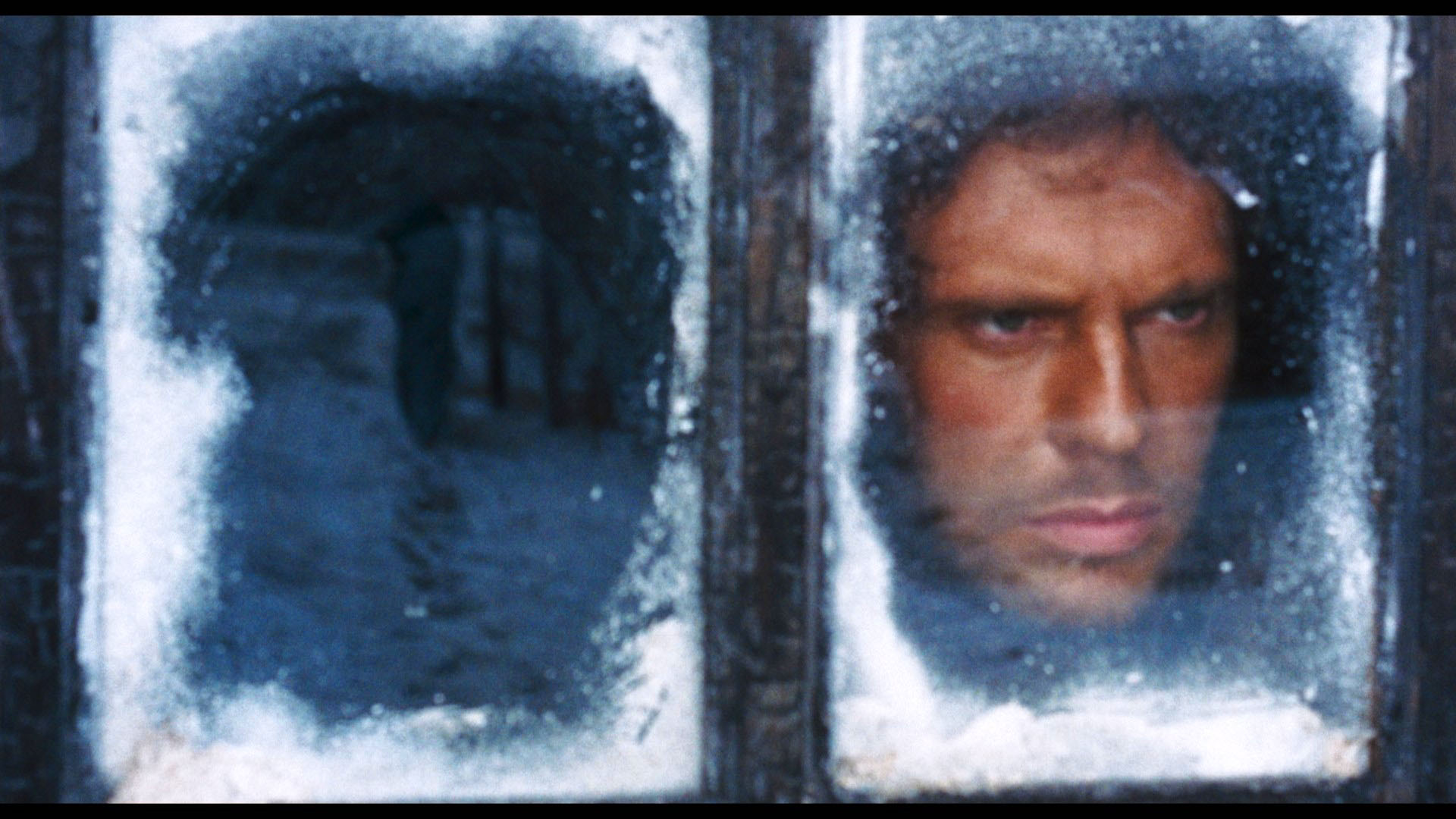 respects The Great Silence is a far more impressive work. As with Django, he avoids the spacious scope framing one normally associates with the genre, choosing instead to evoke a tight, claustrophobic atmosphere through bizarre framing and cramped
respects The Great Silence is a far more impressive work. As with Django, he avoids the spacious scope framing one normally associates with the genre, choosing instead to evoke a tight, claustrophobic atmosphere through bizarre framing and cramped 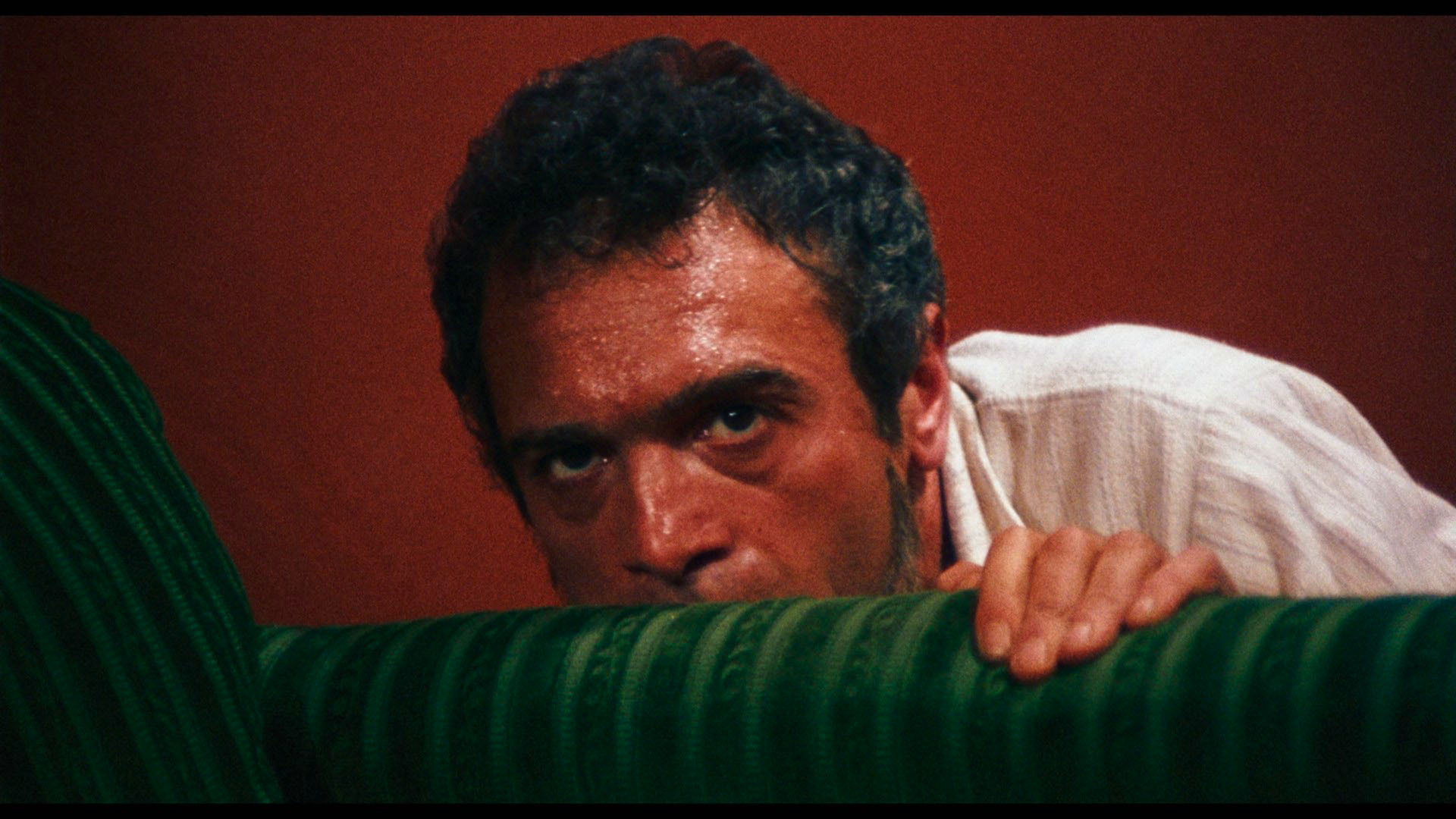 visual spaces. The oppressive snowstorms which punctuate the film provide some startling tableaux of men on horseback trudging through the hills; even more than the notorious Cut-Throats Nine, this is a western that seeps into your bones and makes you want to curl up in front of a fireplace for a few hours. The rough technical nature of the film (some rough edits, a few shaky camera shots, visible imperfections in some of the film stock) in many ways enhances its curiosity value, distinguishing it from the slick Hollywood product of a director like John Ford. Naturally it also wouldn't be complete without an Ennio Morricone score, and the maestro doesn't disappoint. The main theme is one of his most haunting, and the rest of the music perfectly captures the violence and melancholy inherent in the story.
visual spaces. The oppressive snowstorms which punctuate the film provide some startling tableaux of men on horseback trudging through the hills; even more than the notorious Cut-Throats Nine, this is a western that seeps into your bones and makes you want to curl up in front of a fireplace for a few hours. The rough technical nature of the film (some rough edits, a few shaky camera shots, visible imperfections in some of the film stock) in many ways enhances its curiosity value, distinguishing it from the slick Hollywood product of a director like John Ford. Naturally it also wouldn't be complete without an Ennio Morricone score, and the maestro doesn't disappoint. The main theme is one of his most haunting, and the rest of the music perfectly captures the violence and melancholy inherent in the story.
Many viewers first experienced The Great Silence in some video incarnation connected to the Japanese laserdisc, which was slightly overmatted but good for its time. The Fantoma DVD from 2001 initially distributed by Image Entertainment marked the extremely overdue U.S. release of the film, and the original negative with the English soundtrack was used for the transfer with every imperfection intact like the textured fabric over the camera in some shots. The disc also includes a battered theatrical trailer, extensive liner notes, an appreciative introduction by director Alex Cox (who used McGee in Repo Man), and best of all, an unused "happy ending" (which, spoiler haters will note, gives away the fact that the movie's real ending is about as horrifically grim as they come). This bizarre resolution (including a freakish twist involving Trintignant's hand) contained no existing audio, so Cox contributes his own
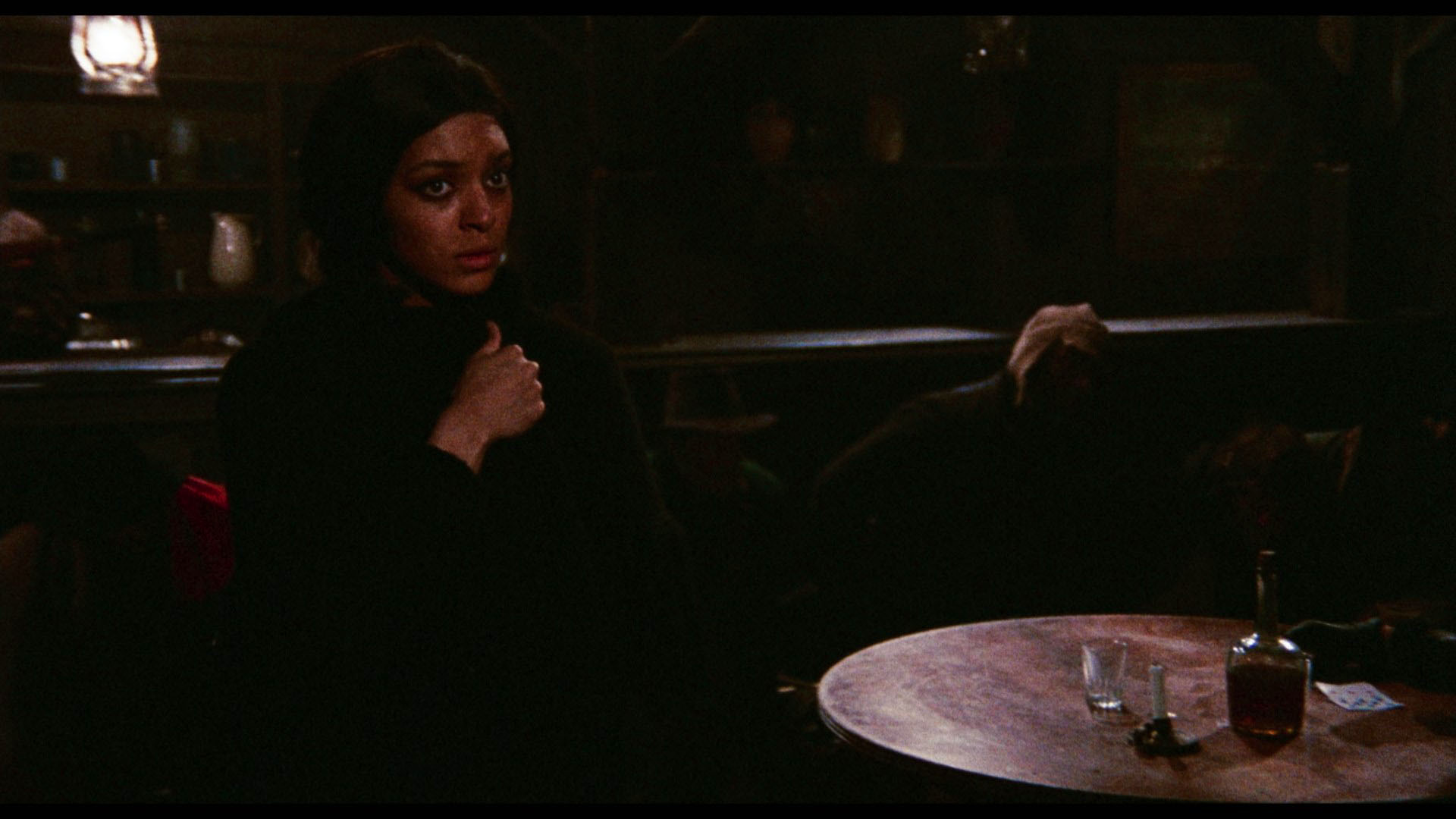 analysis of this anomaly on an optional audio track.
analysis of this anomaly on an optional audio track. 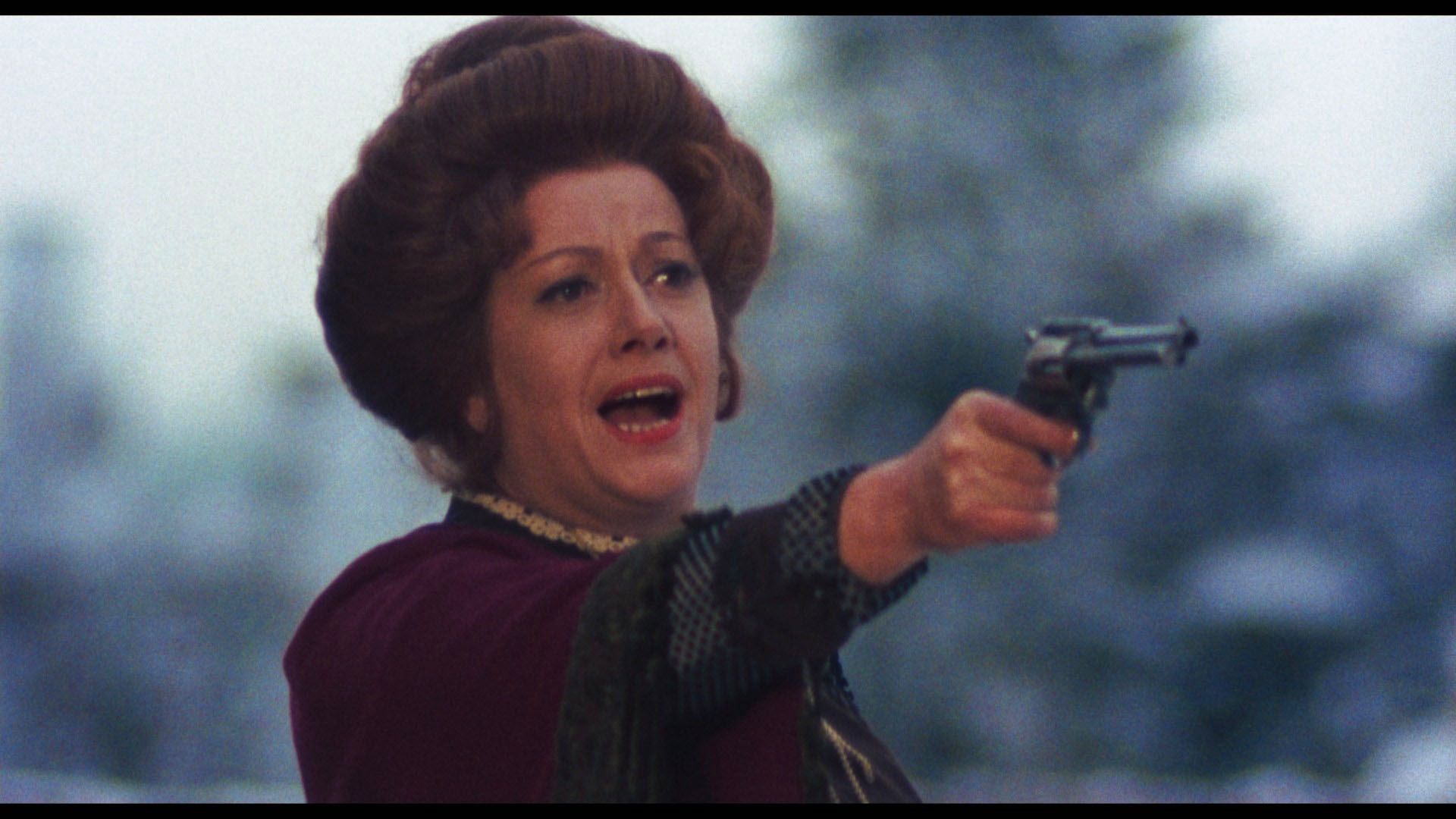 Variations of the same package were later issued on DVD around the world, some bumping the scan up to make it anamorphic but not really changing much quality-wise.
Variations of the same package were later issued on DVD around the world, some bumping the scan up to make it anamorphic but not really changing much quality-wise.An HD restoration of the film was finally undertaken in 2017 and first appeared on Blu-ray and DVD in German from Filmjuwelen (under its Al!ve imprint) featuring a fine audio commentary by Mike Siegel, the happy ending (now with Italian audio with subtitles), an uncovered alternate "ambiguous" ending, the shorter German theatrical cut as an extra, a 10m15s "Filming Silenzio: Behind the Scenes of Sergio Corbucci’s Il Grande Silenzio" featurette, a "Promoting Silenzio" slideshow (9m16s) of posters and lobby cards, a "Silenzo in Pictures" gallery (6m51s), and trailers. The following year in the U.S., Film Movement gave the film a specialty market theatrical release followed by a Blu-ray and DVD special edition with the two alternate endings, original and reissue trailers, a "Cox on Corbucci" featurette (14m46s) with Alex Cox in an appropriately snowy setting evaluating the film and its director, the 1968 "Western, Italian Style" short documentary (38m1s) featuring making-of footage from this film, more bonus trailers from the label, and an insert booklet with liner notes by Simon Abrams. The film itself looks quite nice here (widescreen at 1.85:1 here with much more image info than the flat 1.66:1 DVD) and now features the English track and the Italian one with optional English subtitles.
In 2021, Eureka brought the film to U.K. Blu-ray as part of its Masters of Cinema series taken from the same restoration (in Italian or English) but
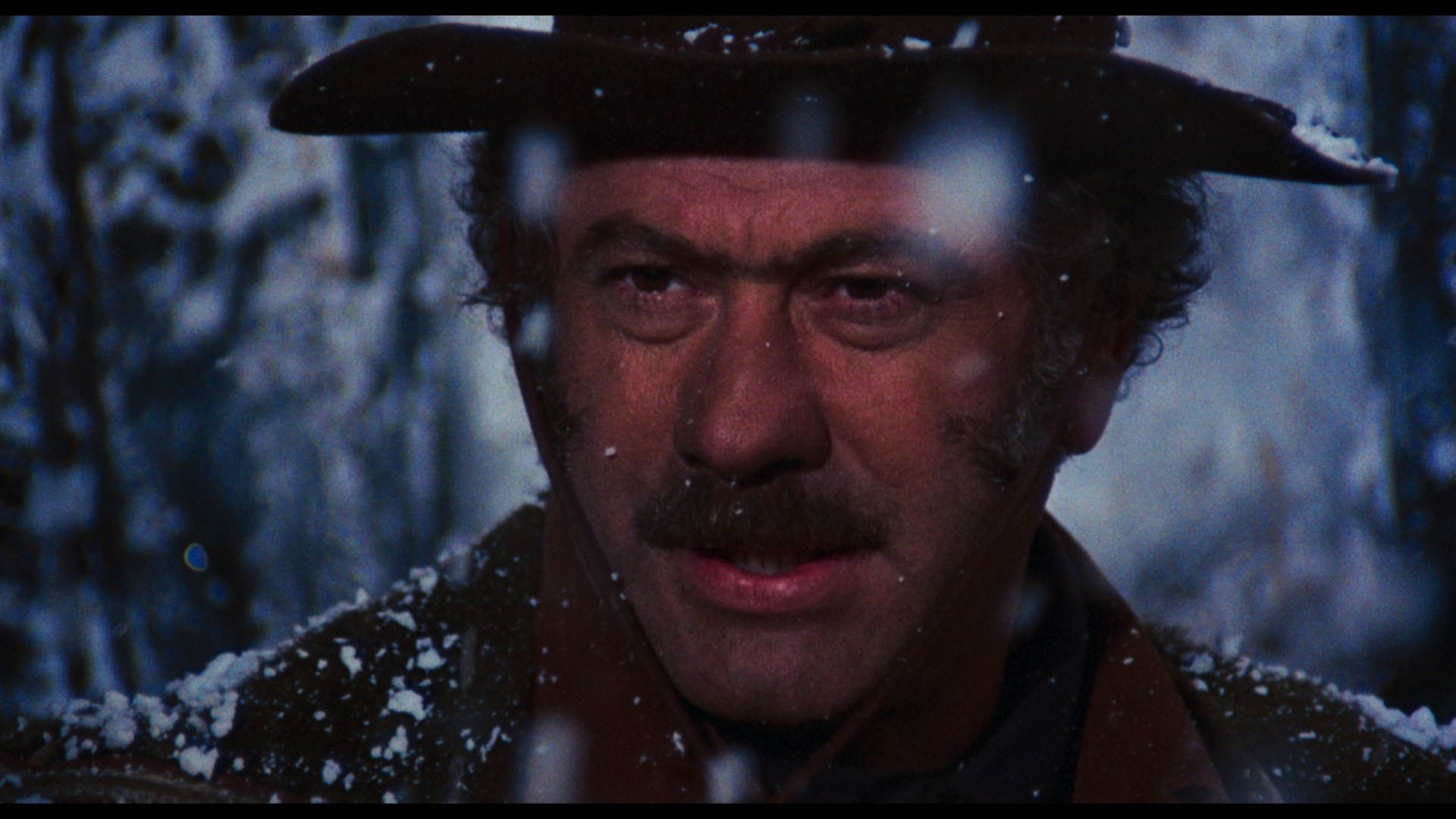 amping up the saturation a lot, which turns disastrous in dark firelight scenes (such as the third frame grab comparison below). Here you get the Siegel commentary plus two new ones, the first with writer Howard Hughes and filmmaker Richard Knew and the second with Cox, all worth checking out as they surprisingly don't overlap much. All of the featurettes from the Film Movement disc are ported over here, plus an appraisal by Austin Fisher (14m28s) and the Italian trailer. A 4K restoration was later undertaken and premiered on German UHD and Blu-ray in 2025 from Filmjuwelen; the HDR-compatible Dolby Vision grade makes a big difference here, handling the tricky color and texture choices in the film more skillfully and giving a sense of depth here that was missing before. More image info
amping up the saturation a lot, which turns disastrous in dark firelight scenes (such as the third frame grab comparison below). Here you get the Siegel commentary plus two new ones, the first with writer Howard Hughes and filmmaker Richard Knew and the second with Cox, all worth checking out as they surprisingly don't overlap much. All of the featurettes from the Film Movement disc are ported over here, plus an appraisal by Austin Fisher (14m28s) and the Italian trailer. A 4K restoration was later undertaken and premiered on German UHD and Blu-ray in 2025 from Filmjuwelen; the HDR-compatible Dolby Vision grade makes a big difference here, handling the tricky color and texture choices in the film more skillfully and giving a sense of depth here that was missing before. More image info 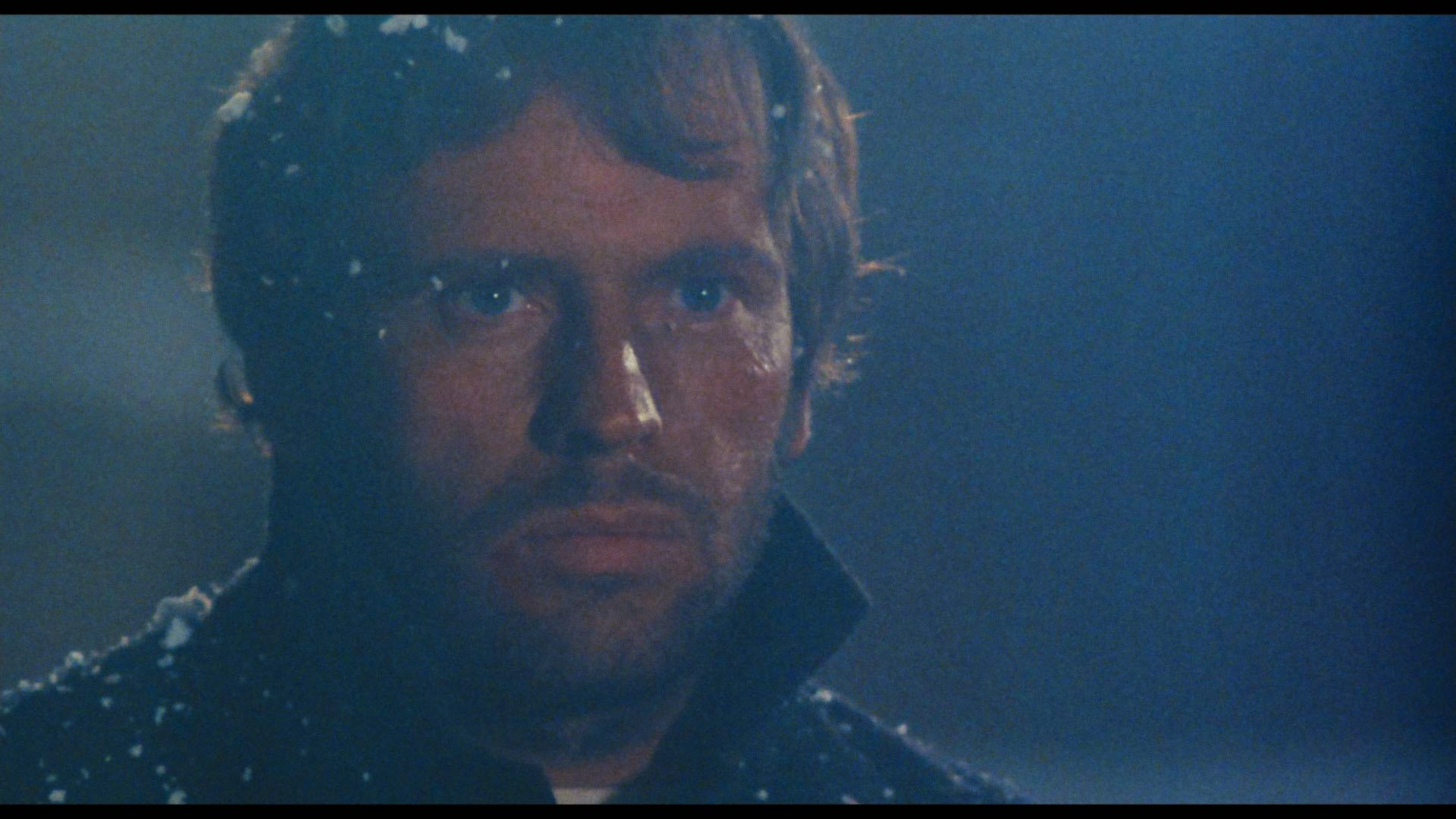 than ever before is also visible on the sides, and it's English-friendly with both the English track and subtitles for the Italian DTS-HD MA 2.0 mono audio. All three previous English commentaries are here plus a new German-only one by Dr. Rolf Giesen; the three Film Movement featurettes are also here plus the two alternate endings (with optional Cox commentary), "Western, Italian Style," an 8m39s German-language Kinski interview, a 4m13s intro by critic Jean-Pierre Dionnet and a 21m55s scene-specific commentary for the opening by Olivier Pére from the film's 2003 French release from Studiocanal, and a new French (with German subs) intro by disc producer Jean-Baptiste Thoret (9m34s). Also included are the Italian, English, German, and French trailers, plus the French and German opening and closing credits.
than ever before is also visible on the sides, and it's English-friendly with both the English track and subtitles for the Italian DTS-HD MA 2.0 mono audio. All three previous English commentaries are here plus a new German-only one by Dr. Rolf Giesen; the three Film Movement featurettes are also here plus the two alternate endings (with optional Cox commentary), "Western, Italian Style," an 8m39s German-language Kinski interview, a 4m13s intro by critic Jean-Pierre Dionnet and a 21m55s scene-specific commentary for the opening by Olivier Pére from the film's 2003 French release from Studiocanal, and a new French (with German subs) intro by disc producer Jean-Baptiste Thoret (9m34s). Also included are the Italian, English, German, and French trailers, plus the French and German opening and closing credits.In 2026, the film hit American UHD and Blu-ray from Film Movement as a limited edition slipcover set (with a booklet with essays by Nick Newman, Elena Lazic, and Filipe Furtado) and a standard option, both of which sold out in record time for direct sale with the latter going to general retail in late February. Indications were soon made that a version with different art will hit the market to meet what is clearly very high demand, so stay tuned. The presentation on the UHD and Blu-ray is pretty much identical to the German one, which is good news as it looks great; both the English and Italian DTS-HD MA 2.0 mono tracks sound excellent and feature optional English subtitles. Here you get all three of the English commentaries (Hughes/Knew, Siegel, Cox), the Austin Fisher U.K. featurette, "Cox on Corbucci," "Western, Italian Style," both alternate endings (with sound plus the one Cox commentary), and the original and 2018 reissue trailers.